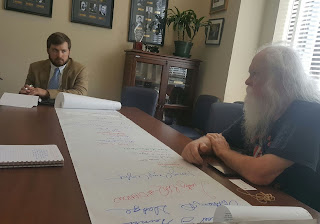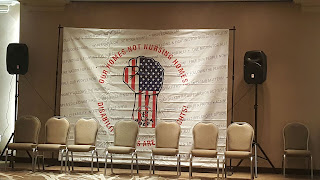MCIL Focus Group: SNAP Benefits and the work requirement
On September 29, MCIL held a focus group to gage the Memphis disability communities reaction to the scheduled change to the Food Stamp Program. There were six participants in the focus group with various disabilities. The focus group started with a brief overview of the news about the addition of the work requirement and who it will cover.
The first question also helped to provide the group with basic information about the new work requirement.
What do you know about the SNAP work requirement?
The group responded with various bits of information about the change. They noted that it did not cover people with dependants and people in school. There was more discussion about what volunteer programs and work programs would exempt people from the requirement. The group knew details about the change, stating that people would not be instantly denied and that the beginning will be delayed.
The bulk of the discussion was on the “able-bodied” requirement. The group felt that the distinction was aimed at people with disabilities, and that it was not clear. Everyone thought that it cast the disability community as not productive and not included.
How do you feel about the exemption of people with disabilities?
One respondent thought it depended on a person’s level of disability. They thought that if you have an obvious physical disability, you were also tagged with the stigma of the exemption. Another participant felt that all people should be held to the same standard, but the community should be ready to make accommodations that are needed just like in the ADA.
One participant thought that they should take out the term “able-bodied” and make other, more clear qualifications for who would be required to work and who would be exempt.
The group seemed to have a consensus that the exemption also limited the opportunities that people with disabilities would have. One respondent said that it means that “people with disabilities don’t have to try.”
Another participant said that more jobs means more opportunities, but if people with disabilities are left-out here, they will not find opportunities and not find jobs. Someone else pointed out that more jobs for people with disabilities also would mean more accessibility and more information in the community about work and accommodations.
How do you feel about an incentive program: people with disabilities that volunteer, work or are in a work program would get more benefits?
This hypothetical was positively received. One respondent said that volunteering means that person has more needs that are not covered by the job. The volunteer has more needs in transportation, laundry and general expenses. Another person in the focus group said that volunteers also have less time to do housekeeping and shopping. They all thought the incentive was a good idea and that a 100% increase was too much. The group felt that 50% was reasonable. For example, a $50 SNAP benefit would increase to $75 for a person with a disability in this hypothetical program.
What is the biggest employment issue for the community al large in Memphis?
Some things were suggested. The lack of a living wage, the dominance of temporary jobs without benefits and the lack of reliable public transportation. Because there was no clear biggest issue, the group added some other problems they felt the city faces. Getting businesses to come to Memphis was seen as a problem and that can be from education, economy or even transportation.
The focus group stated some specific problems when the question was applied to just people with disabilities. One respondent said that job-placement at the Division of Vocational Rehabilitation was a significant barrier for our community. There was however general consensus on this question for people with disabilities. Everyone, at this point, agreed that transportation was the biggest barrier for our community.
To solve this problem the group suggested more job-training and more job readiness. They felt that employers need more info and more options to hire people with disabilities. One participant said that poor education in our community from segregated schools and low expectations of students with disabilities was a barrier for our community. Some of the focus group rethought their feeling that transportation was the biggest barrier and felt that discrimination may be larger of a barrier than transportation.




